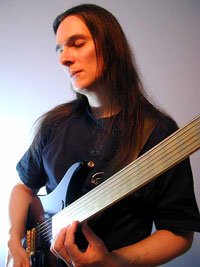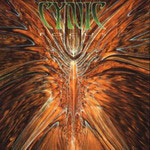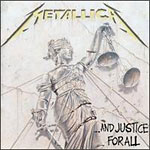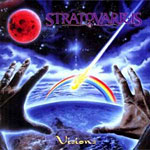|
|
Interview with Tim Donahue - Tim Donahue
Look no frets, no really no frets! A fretless guitar, an instrument that so few have pioneered, only a few jazz/fusion artists and noted players such as Andy Summers and Pat Metheny have occasionally played. But a musician/composer who has worked in the metal, jazz, and soundtrack scoring industry with a career that spans decades has come to the forefront recently with the release of Madmen & Sinners, a record that was created with the help of Dream Theater vocalist James Labrie and Steve Vai drummer Mike Mangini. The album, which was several months, if not a year or two in the working, has shown a much more elevated evolution for Donahue, having released several records, one in particular, 1996's Voices in the Wind, part instrumental with the other part featuring Paul Rodgers singing the more laid back cuts, Donahue has come a long way from his days as a Berklee student (the famed Boston music school).
So Niagara Falls native Donahue was kind enough to answer a few questions I had about all his endeavors as a musician, what has influenced him as a musician, what holds for the future for the inventive guitarist, and his interesting views on the music scene today.
The fretless guitar is an instrument that so few play (at lest to my knowledge), only a handful of jazz and blues artists play them, and that instrument in particular is now coming to light. What gave you the idea of playing a fretless guitar?
TD: I've been playing fretless guitar for over 22 years, simply because I love the sound of it.
It gives me a unique musical voice. I can control the pitch and articulation of each note more effectively on the fretless than on a regular guitar. But it took a lot of work and dedication to bring it to that point.
The big difference between playing fretless and standard guitar is the fact that you really have to LISTEN to what you play on the fretless, and play everything deliberately. The fretless is also more challenging to me than regular guitar.
Within the last 15 years, I've released a lot of music for fretless guitar- from fusion to jazz to metal to TV space music. MADMEN & SINNERS is my 6th solo album.
Besides having a career as a musician, I understand that you have designed your own guitars in the past, what were some of the guitars that you had played before that influenced your design and so forth?
TD: Actually, I made my first guitar- my version of a Gibson SG Standard. My next few guitars were all Gibsons- a solidbody L6-S, a real vintage Explorer, 2 SG Standards, a vintage SG/Les Paul, and ES-175 hollowbody. I wish I had those guitars today.
I understand you attended Berklee college of Music. How was the experience at Berklee, (by the way, where are you from)? What did you think of the Boston music scene (as far as hard rock/metal goes) while you where there?
TD: I loved my time at Berklee- my years there were very productive, especially because I wrote tons of music.
I started playing fretless guitar during that time too, and my teachers were very supportive of me.
Keep in mind that I graduated from Berklee in 1982(!!!), and there was very little rock at Berklee at that time.
90% of the music coming out of Berklee was jazz, or something else. Not much rock. Consequently, I was playing some harmonically complicated jazz, because I was really into (German jazz record label) ECM at that time. So, I wasn't playing rock at all, and was totally unaware of any rock scene in Boston!
Who were some of the guitarists/musicians that influenced you?
TD: Hendrix' and Claude Debussy's music knocked me out at an early age. After that, I listened to everything you can imagine, and it all seemed to influence me one way or another. Looking back, I still find the older music of Rush, Genesis and King Crimson to be the most satisfying. Of course, I love many other bands, but most of them seem to come from the 70's. Bands like Focus, Rennaisance, Pink Floyd, Yes, UK and Black Sabbath will forever have a place in my heart.
In your career that has spanned numerous albums, numerous projects, soundtrack scoring for TV/movies and so forth, what were some of your favorite projects that you have worked on? Favorite records? How have you seen yourself evolve as a musician?
TD: I really don't really have any favorite TD albums- I love them all for different reasons. For example, I'm very pleased with the soundtrack I did for the Japanese movie MARKS NO YAMA because it gave me a chance to compose and orchestrate on a grand scale, for any instrumentation I wanted.
I love the VOICES IN THE WIND album with because working with vocalist Paul Rodgers and producer Eddie Kramer was a very creative experience. I'm especially happy with the songwriting on INTO THE LIGHT. And of course, I love the beauty, heaviness and dark ambience of MADMEN & SINNERS.
You have worked with vocalists such as Paul Rodgers and James Labrie, how was it working with those guys.
TD: Paul is a very spontaneous singer, he sang great on VOICES IN THE WIND.
For that album, we didn't want to "craft" the vocal tracks, because that album was meant to be very spontaneous to begin with. So Paul was perfect for that situation, and he sang every song in 3-4 takes.
Working with James was very different. MADMEN & SINNERS is not a spontaneous album at all- it's very conceptual.
James normally likes to craft each vocal track, and this way worked great for the MADMEN & SINNERS album.
It was important for us to "paint" the vocal tracks in accordance with the album's concept.
How was it working with Eddie Kramer for Voices in the Wind?
TD: Ah, Eddie. we had a great time on that album. Eddie of course, has worked with all the legends of rock. He is one of the few remaining people who worked closely with Hendrix, etc. So, I naturally had enormous respect for him. But at the same time, Eddie showed his utmost respect for me, and always
let me know that he dug what I was doing musically and guitar-wise. Our relationship was based around mutual respect.
It's funny- during the VITW recording sessions we agreed on a lot of things, but we disagreed on some things too.
But it all goers back to the respect we had for each other- because even when we disagreed, it led to a creative result.
After working with Eddie, I realized why his name is associated with so much great music. He is a legendary producer because his sincere respect for an artist brings out the best in that artist. I learned a lot from Eddie and could go on and on.
Tell me about the making of Madmen & Sinners, what influenced the writing both musically and lyrically?
TD: MADMEN & SINNERS is based on the craziness of modern society and the hypocrisy of established religions. The insanity of nuclear war is discussed, a lot of cynical references to religious extremism that can be found in the lyrics. MADMEN & SINNERS will only appeal to sophisticated listeners... It's definitely not for simple-minded people!
For me, the MADMEN album has the perfect blend of beauty, technical playing, melodic songwriting and orchestration.
It's the kind of balance of what I'd like to hear more of in prog/metal today.
How did the recording process go?
TD: We recorded Mike's drums in Boston, James' vocals in Toronto, and the rest of the album was done at my studio.
There are always technical problems to overcome in any recording session. But for some reason, MADMEN & SINNERS had a lot of unforeseen problems that arose midway through the album's production. I almost lost the entire album, and would have had to re-record it all over again.
Fortunately, my tech people came through and got me running again. But for most of the summer of 2003, I was a REAL madman, not knowing if I needed to start over.
Other than that, the recording process was pretty straight ahead. Since I played 90% of the instruments on this album, it took me much longer to record everything, than if the album were recorded by a band. The advantage of doing it this way is I'm guaranteed 100% satisfaction. With a band,
I'd have to put up with all sorts of personal problems and disagreements about how the music should be done. I don't have time for that, especially when an album is already finished in my head.
On the subject of recording, how has new technology like Pro-Tools, and other Digital Audio Workstation software and this evolution recording affected you? What are some of your favorite recording or guitar "toys" that you have used in the past? Analog or Digital?
TD: There's no doubt that Protools and DAWs have put a lot of recording power into the hands of musicians who would normally have to pay outrageous prices for studio time. Even so, anyone who owns this kind of hard drive-based gear knows that it can be difficult to get a great recording.
This is not so much because of the digital aspect of the gear- it can be just as difficult to get a great recording from analog. The trick is to learn basic recording techniques and apply them to any recording situation.
A lot of people mistakenly think that digital recording generally sounds great. I used to think this too, but the more time I spent with Protools and DAWs, the more I realized that basic recording techniques must still be learned and used. So for me, the DAW issue means that I can own my own studio and record my albums without having to rely too much on outside studios. But it also means I had to learn the basics, which I probably wouldn't have done unless I owned my own studio in the first place.
As far as recording "toys" are concerned, I don't really have a favorite piece of gear. I use whatever sounds best for the music. This generally goes for guitar effects too. But oddly enough, sometimes a cheaper effects unit sounds better than one costing thousands of dollars. A good example of this is the Roland Digital Dimension DC-3, which I use on my fretless electric harp guitars. I've tried every chorus unit there is on the planet, but the DC-3 is the best for my electric harp guitars. So I guess this is my favorite effects toy.
Dealing with different record companies in the past, what was the basis for signing to Frontiers Records? Are they also going to take care of the U.S. distribution?
TD: I must admit, I've been very lucky. I've been signed to good record labels for over 10 years straight, and have always been given the freedom to make albums the way I want to make them. Frontiers Records has been enormously supportive- they licensed my albums long before they were even recorded!
Not many labels will do this these days- they all want to hear the finished product before commiting to anything. But Frontiers and my Japanese labels got behind my work beforehand, which means I had a budget to get the albums done.
Promo for MADMEN & SINNERS is now full steam ahead, and Frontiers is really pushing the album. What more could an artist want from their label?
Frontiers Records has been great. Frontiers just informed me they licensed the MADMEN album to Navarre in the USA.
With underground music sales and notoriety increasing and mainstream acts coming and going. As far as the mainstream and the current problems that face the record industry today, such as MP3 downloading, retail sales slumping, record sales in general slumping for the "Big 5," and numerous other issues, where do you see the record industry in the next few years as it goes through changes?
TD: I believe the important issue facing "real" artists today is not digital piracy. The issue that needs to be addressed is the loss of our music culture to corporations who churn out crap on a daily basis. Pop music has become so pervasive and BAD, no wonder why music in general has lost its worth in our society. Music has become just another commodity for consumption. And that's what people do with the music they download. They consume it, and spit it out. To them, it's worth nothing- it's no wonder why people swap files without a thought. People obviously have no idea how much work went into making even a shitty pop album. But that's not the reason why piracy is wrong- that's an issue of intellectual property, etc.
In short, music appreciation and education is not high on the MacDonald's mentality list of social priorities. So the ones that stand to lose the most from digital piracy are the ones who have created this pathetic social situation. The RIAA and music pirates need to be educated about the results of their actions.
End of sermon.
And the Hashman could not have said it better himself.
What are some of the artists that you are currently listening to?
TD: Since I'm in the writing stage of MADMEN 2, I don't listen to too much music other than the current demos and some very special prog rock.
Last night I put on DARK SIDE OF THE MOON and that did the trick!
Often times I receive CD promos from record labels, and I try to listen to as much as possible.
But when I really want to be moved, I find myself going back to prog music of the 70's.
Are there any projects that you are planning for the future, besides more solo material?
TD: There's nothing more important to me than my solo albums, so most of my writing is specifically for that.
I'm open to using some material for albums other than my solo projects. For example, I have some material that I think would be perfect for Sarah Brightman.
Do you plan on touring for Madmen & Sinners? Any interesting tour stories?
TD: There have been discussions about touring for the album. But recently Toshiba-EMI suggested making a promo video for M&S, and this may take the place of touring. In any event, fans can always get the latest MADMEN news at the official website.
Well on behalf of RevelationZ magazine, the rest of the staff and I really thank you.
TD: My pleasure Tommy- many thanks for your support!
|  |
Written by Hashman - 6/6/2004 |
This article has been shown 5299 times. Go to the complete list.
RevelationZ Comments
|
|
|
|
Daily Spotlight
Cynic - Focus
 Cynic started out as a death metal band in 1987 and over the next several years sent out five demos until th.... Cynic started out as a death metal band in 1987 and over the next several years sent out five demos until th....
Read full review
Retro Reviews
(Tommy)
Metallica - ...And Justice For All
 What presents itself from the first creeping guitar lines in Blackened to the final drum attack has faded in Dyers Eve is a forceful lesson in how to combine hardness.... What presents itself from the first creeping guitar lines in Blackened to the final drum attack has faded in Dyers Eve is a forceful lesson in how to combine hardness....
Read full review
(Tommy)
Stratovarius - Visions
 In so many ways this albums represents what I would call a perfect Power Metal album, many of these songs became classics in no time and they haven't lost any of their shine.
Timo Tolkki, Jari Kainul.... In so many ways this albums represents what I would call a perfect Power Metal album, many of these songs became classics in no time and they haven't lost any of their shine.
Timo Tolkki, Jari Kainul....
Read full review
Archive
· Albums of the month
· Retro Reviews
|
|
|